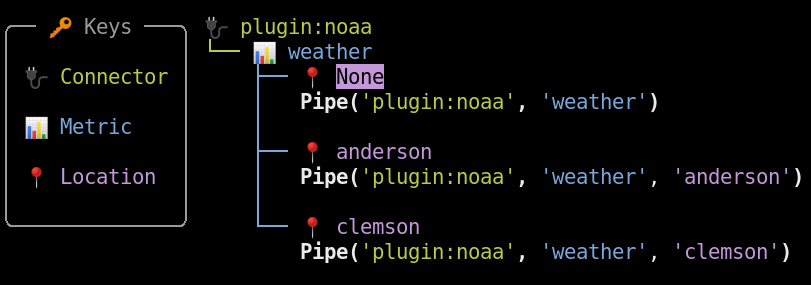
Security News
PyPI’s New Archival Feature Closes a Major Security Gap
PyPI now allows maintainers to archive projects, improving security and helping users make informed decisions about their dependencies.

| PyPI | GitHub | Info | Stats |
|---|---|---|---|
 |  |  |  |
 |  |  |  |

Meerschaum is a tool for quickly synchronizing time-series data streams called pipes. With Meerschaum, you can have a data visualization stack running in minutes.

Two words: incremental updates. Fetch the data you need, and Meerschaum will handle the rest.
If you've worked with time-series data, you know the headaches that come with ETL. Data engineering often gets in analysts' way, and when work needs to get done, every minute spent on pipelining is time taken away from real analysis.
Rather than copy / pasting your ETL scripts, simply build pipes with Meerschaum! Meerschaum gives you the tools to design your data streams how you like ― and don't worry — you can always incorporate Meerschaum into your existing systems!
You can find a wealth of information at meerschaum.io!
Additionally, below are several articles published about Meerschaum:
For a more thorough setup guide, visit the Getting Started page at meerschaum.io.
pip install -U --user meerschaum
mrsm stack up -d db grafana
mrsm bootstrap pipes
Please visit meerschaum.io for setup, usage, and troubleshooting information. You can find technical documentation at docs.meerschaum.io, and here is a complete list of the Meerschaum actions.
### Install the NOAA weather plugin.
mrsm install plugin noaa
### Register a new pipe to the built-in SQLite DB.
### You can instead run `bootstrap pipe` for a wizard.
### Enter 'KATL' for Atlanta when prompted.
mrsm register pipe -c plugin:noaa -m weather -l atl -i sql:local
### Pull data and create the table "plugin_noaa_weather_atl".
mrsm sync pipes -l atl -i sql:local
import meerschaum as mrsm
pipe = mrsm.Pipe(
'foo', 'bar', ### Connector and metric labels.
target = 'MyTableName!', ### Table name. Defaults to 'foo_bar'.
instance = 'sql:local', ### Built-in SQLite DB. Defaults to 'sql:main'.
columns = {
'datetime': 'dt', ### Column for the datetime index.
'id' : 'id', ### Column for the ID index (optional).
},
)
### Pass a DataFrame to create the table and indices.
pipe.sync([{'dt': '2022-07-01', 'id': 1, 'val': 10}])
### Duplicate rows are ignored.
pipe.sync([{'dt': '2022-07-01', 'id': 1, 'val': 10}])
assert len(pipe.get_data()) == 1
### Rows with existing keys (datetime and/or id) are updated.
pipe.sync([{'dt': '2022-07-01', 'id': 1, 'val': 100}])
assert len(pipe.get_data()) == 1
### Translates to this query for SQLite:
###
### SELECT *
### FROM "MyTableName!"
### WHERE "dt" >= datetime('2022-01-01', '0 minute')
### AND "dt" < datetime('2023-01-01', '0 minute')
### AND "id" IN ('1')
df = pipe.get_data(
begin = '2022-01-01',
end = '2023-01-01',
params = {'id': [1]},
)
### Shape of the DataFrame:
### dt id val
### 0 2022-07-01 1 100
### Drop the table and remove the pipe's metadata.
pipe.delete()
# ~/.config/plugins/example.py
__version__ = '1.0.0'
required = ['requests']
def register(pipe, **kw):
return {
'columns': {
'datetime': 'dt',
'id' : 'id',
},
}
def fetch(pipe, **kw):
import requests, datetime, random
response = requests.get('http://date.jsontest.com/')
### The fetched JSON has the following shape:
### {
### "date": "07-01-2022",
### "milliseconds_since_epoch": 1656718801566,
### "time": "11:40:01 PM"
### }
data = response.json()
timestamp = datetime.datetime.fromtimestamp(
int(str(data['milliseconds_since_epoch'])[:-3])
)
### You may also return a Pandas DataFrame.
return [{
"dt" : timestamp,
"id" : random.randint(1, 4),
"value": random.uniform(1, 100),
}]
uvicorn, gunicorn, and FastAPI.$MRSM_ROOT_DIR lets you emulate multiple installations and group together your instances.For consulting services and to support Meerschaum's development, please considering sponsoring me on GitHub sponsors.
Additionally, you can always buy me a coffee☕!
Copyright 2021 Bennett Meares
Licensed under the Apache License, Version 2.0 (the "License"); you may not use this file except in compliance with the License. You may obtain a copy of the License at
http://www.apache.org/licenses/LICENSE-2.0
Unless required by applicable law or agreed to in writing, software distributed under the License is distributed on an "AS IS" BASIS, WITHOUT WARRANTIES OR CONDITIONS OF ANY KIND, either express or implied. See the License for the specific language governing permissions and limitations under the License.
FAQs
Sync Time-Series Pipes with Meerschaum
We found that meerschaum demonstrated a healthy version release cadence and project activity because the last version was released less than a year ago. It has 1 open source maintainer collaborating on the project.
Did you know?

Socket for GitHub automatically highlights issues in each pull request and monitors the health of all your open source dependencies. Discover the contents of your packages and block harmful activity before you install or update your dependencies.

Security News
PyPI now allows maintainers to archive projects, improving security and helping users make informed decisions about their dependencies.

Research
Security News
Malicious npm package postcss-optimizer delivers BeaverTail malware, targeting developer systems; similarities to past campaigns suggest a North Korean connection.

Security News
CISA's KEV data is now on GitHub, offering easier access, API integration, commit history tracking, and automated updates for security teams and researchers.